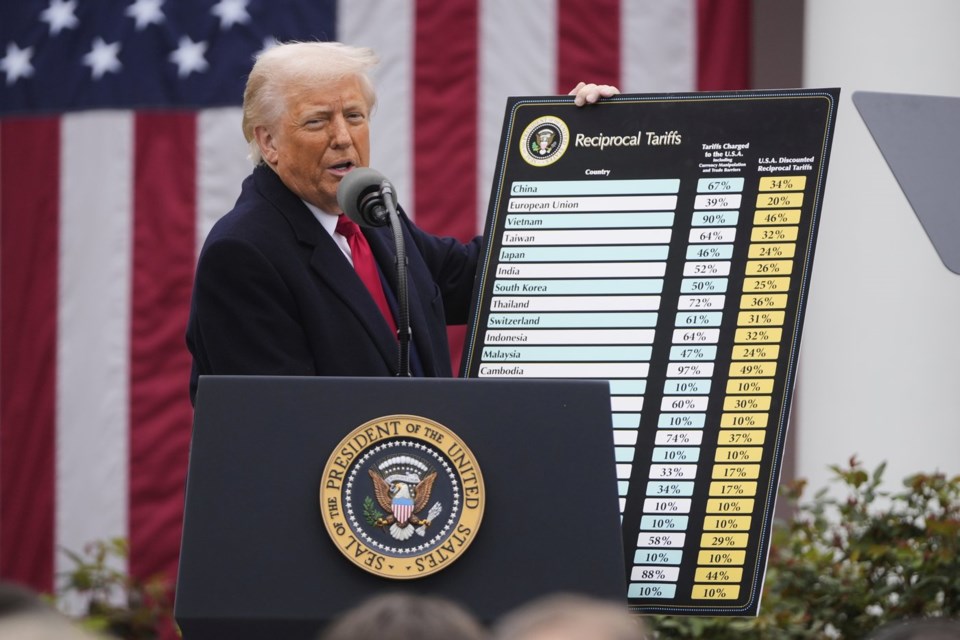WASHINGTON — U.S. President Donald Trump's global trade war is an "illegal and abusive" use of power, said a lawyer representing small businesses who are challenging the tariffs.
George Mason University law professor Ilya Somin, along with the Liberty Justice Center, represents five American small businesses who had a hearing before the U.S. Court of International Trade last week in an effort to block Trump's sweeping "reciprocal" tariff agenda.
"He's sort of breaking various precedents and doing things which are highly illegal and obviously our contention is that this is highly illegal," Somin said in an interview Thursday.
The president is facing at least seven lawsuits that argue Trump has acted beyond his powers by wielding tariffs through the International Economic Emergency Powers Act of 1977.
The act, usually referred to by the acronym IEEPA, is a national security statute that gives the U.S. president authority to control economic transactions after declaring an emergency.
While its predecessor, the Trading With The Enemy Act, was used during the Nixon administration to briefly impose a 10 per cent tariff on all imports into the U.S., no president has used IEEPA for tariffs.
Somin said the statute does not mention tariffs, nor is there even a synonym, such as duties. The U.S. Constitution gives power over taxes and tariffs to Congress and Somin said Trump is misusing the statute.
"Our most basic argument, and also that of others challenging various uses of IEEPA to impose tariffs including against Canada, is that this statute does not authorize tariffs at all," Somin said.
Trump declared an emergency at the northern border in order to use IEEPA to slap Canada with tariffs in March. He partially paused the duties a few days later for imports under the Canada-U.S.-Mexico Agreement on trade.
At the same time he used the same presidential power to hit Mexico and China with tariffs, citing the flow of people and deadly fentanyl into the United States as the emergency for all three countries.
U.S. government data shows a minuscule volume of fentanyl is seized at the northern border.
Trump also declared an emergency around trade deficits in April, using IEEPA to take his trade war to the world with "reciprocal" tariffs. The president walked back the most devastating duties a few hours later, saying the 90-day pause would give countries time to negotiate a deal. He kept a 10 per cent universal levy in place.
Trump on Friday threatened to increase tariffs on imports from the European Union to 50 per cent next month. In a separate social media post, Trump said if Apple doesn't move iPhone manufacturing to the U.S., it will face 25 per cent tariffs.
Markets have been in turmoil with Trump's inconsistent tariff agenda.
Twelve states argued before the Court of International Trade in New York on Wednesday that tariffs make U.S. trade policy dependent on Trump's whims.
Lawyers for Arizona, Colorado, Â鶹´«Ã½icut, Delaware, Illinois, Maine, Minnesota, Nevada, New Mexico, New York, Oregon and Vermont argued the president exceeded his authority with the tariffs, including by hitting Canada with duties.
Lawyers for the Trump administration countered that Congress, not the courts, determines if the president's rationale for declaring an emergency complies with the law.
Somin's case is separate and only deals with Trump's "reciprocal" tariffs but many arguments are similar. The statute said the emergency must be "extraordinary and unusual " and Somin said they argue that does not apply to Trump's tariff rationale.
Somin said in both hearings the three-judge panel was "highly skeptical" of the claim that Trump has virtually unlimited tariff power.
Somin said he expects the judges to expedite their decision but whichever party loses is almost certainly going to appeal to the federal circuit. Somin said it could end up in front of the Supreme Court.
In the meantime, Somin said the tariffs are causing business uncertainty and economic harm.
"This administration is also characterized by severe economic illiteracy."
— With files from The Associated Press
This report by The Canadian Press was first published May 23, 2025.
Kelly Geraldine Malone, The Canadian Press




